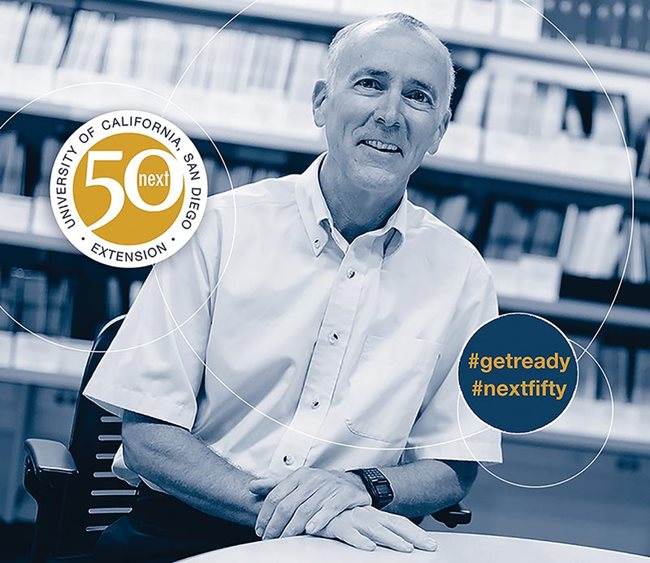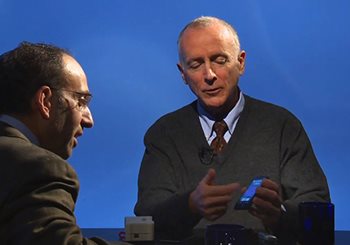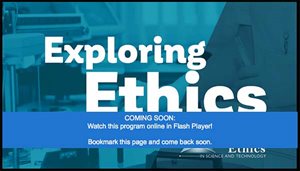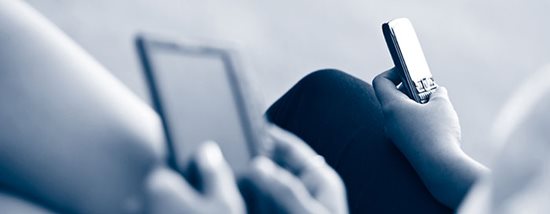9 February 2016
50 Voices of the Future: Kevin Patrick on wearable health care technology

In honor of UC San Diego Extension's first 50 years, 50 Voices of the Future asks thought leaders about the trends, breakthroughs and social advances they foresee over the next 50 years.
Do you walk around the block at night to get your Fitbit to vibrate? Track your calories on your phone? Mobile devices and wearables that contain microprocessors are changing the way we live our lives — and hold secrets to healthier lives, says Dr. Kevin Patrick, a professor at the UC San Diego School of Medicine who also directs the Center for Wireless and Population Health Systems at the university’s Qualcomm Institute/Calit2.
(1) Why is the work you do important?
Think about the five most pervasive companies in our lives today: Apple, Google, Microsoft, Facebook and Amazon. Imagine trying to live without their products ... you can’t. Our group is accelerating the understanding of computing as it relates to health. What’s the first thing we do when a symptom arises? We Google it. Our unique institute is observing the influence information technology and ubiquitous computing has on public health so we can develop effective interventions.
(2) What are the influential/exciting developments happening in your field now and why?
 In this UCTV interview from 2012, Dr. Kevin Patrick is interviewed (by the UC School of Medicine's Dr. David Granet, at left) about the ways his research group uses wearable technology to advance our understanding of public health.
In this UCTV interview from 2012, Dr. Kevin Patrick is interviewed (by the UC School of Medicine's Dr. David Granet, at left) about the ways his research group uses wearable technology to advance our understanding of public health.
An explosion of wearable devices: Fitbit, Apple Watch, Jawbone, etc. There’s a lot of hype but our interdisciplinary team is looking at the evidence — what works and what doesn’t. Wearables can have lasting medical impacts; look at glasses and hearing aids. But we need to find out if, for example, self-monitoring of steps leads to lasting increases in exercise.
Our group just got promising results in a study of text messages in the reduction of obesity rates. With 30 million diabetics in this country and 50 to 70 million Americans pre-diabetic (95 percent of which is related to weight), we have an ethical responsibility to use these new technologies to find better solutions.
(3) What’s the next big thing?
The emergence of “passive sensors.” Two-thirds of adults now use smartphones; we talk into them and the sound is scrambled in signals that are then transmitted. Your phone will soon be able to pick up subtle changes in your speech patterns, such as a slurring of your words. If this occurred, you might be prompted to open an app to determine other signs of a stroke. The camera at the top of your computer screen will become increasingly sophisticated at facial recognition and reading emotions. This might eventually be used to treat a child or a hospice patient who can’t tell us how much pain they are in.
 In a UCTV program to debut March 3, 2016, Dr. Kevin Patrick will discuss how the Health Data Exploration project addresses privacy concerns related to personal health data and technology.
In a UCTV program to debut March 3, 2016, Dr. Kevin Patrick will discuss how the Health Data Exploration project addresses privacy concerns related to personal health data and technology.
(4) How big of an impact will your field play in shaping the future of the San Diego region and beyond?
San Diego is a hotbed for this work with Qualcomm and all the wireless technology companies, Dr. Eric Topol’s group at Scripps, and UC San Diego’s engineering school now the biggest in California. Our region is at the forefront of tech-based medical innovation.
(5) Hop into your time machine…what does the future look like for this field in 50 years? How can individuals/companies get prepared for what’s next?
Assuming we deal with the threat of climate change, we can look forward to a much more systematic and system-wide understanding of health. The amassing of big data and our increased understanding of the threats to public health will enable us to be much more intelligent about where to invest our resources — perhaps childhood education or prenatal care. To keep up with the change, education will be key. Education, education, education.

Take the next step with courses and certificates offered by UC San Diego Extension, including programs in the areas of Healthcare, Technology, and Data Analysis & Mathematics.